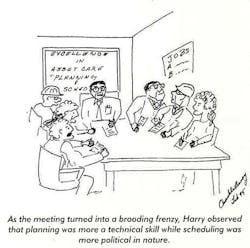Of all things, I saw a Chuckle Berry cartoon in Plant Services magazine more than 20 years ago that terrifically helped me understand how scheduling really works. The picture was just a bunch of people sitting around a table. (That wasn’t funny.) But the caption was hilarious: “As the meeting turned into a brooding frenzy, Harry observed that planning was more of a technical skill while scheduling was more political in nature.” What a great truth!
Planning is more of a technical skill. Once planners understand that they can’t be perfect, they can crank out job plans by the truckload and use the Deming Cycle to improve them over time. In this manner, they can indeed plan all of the work.
They have another crutch in knowing that seasoned craftspersons in most plants can execute work without planning help in the first place. The planners understand that they are not trying to replace craft skills and experience but that they add value in improving job plans over the years. These plans then can be a great reference for skilled and experienced craftspersons. Over time, the plans grow to the point where even new, unseasoned craftspersons could have execution success. Of course, the best system is where craftspersons readily provide feedback to the planners to make jobs even better. What better source of plan improvement could there be than 20 to 30 craftspersons pouring their wisdom and experience into the plant knowledge base via job plans?
Nevertheless, even without collecting feedback, planners can make plans better over the years as the planners themselves have more time to put more details into job plans. Rio Tinto planner Tammy Comeau recently reported to the lead planner Bernie Clavelle: “2 vague, ‘useless’ task lists done this morning! #Demingcycle #gottastartsomewhereThanks Bernie, I haven’t felt this optimistic about my role since I took the job in 2015. I have my confidence back and I’m very grateful to you and Doc for that.”
So we see that once planners understand they don’t have to be perfect, they can plan a lot of work. Also consider that a major reason for needing all of the work planned is that weekly scheduling activity requires estimations of labor hours. But scheduling is more political in nature. Unfortunately, planners cannot do weekly scheduling without the cooperation of first-line supervisors. (Weekly scheduling is distinct from planning, but planners commonly create the weekly schedules, so from here on out we’ll call the planners schedulers.)
The schedulers’ schedules tell the supervisors what to do with the supervisors’ resources. Schedulers must create schedules that are acceptable to the crew supervisors as well as to operations personnel. The scheduler performs a needed “backlog research” service of going through the backlog to “bundle” work together for common LOTO or common plant areas. No one wants to dig through the “black hole” of the maintenance backlog. But if no one does the digging, supervisors will just end up taking care of reactive work and otherwise keeping everyone busy. What a great service if the scheduler can bundle proactive work with reactive work! But the scheduler must be careful to select work that supervisors would choose if they had the opportunity to do so.
Examples of the politics: A supervisor has six journeymen mechanics, but three are fairly new and the supervisor has to be careful when selecting work for them until they become more seasoned. The supervisor fears the scheduler will pick six mechanics’ worth of the hardest mechanical work out of the backlog. It would be wrong for the scheduler to do that.
This article is part of our monthly Palmer's Planning Corner column. Read more from Doc Palmer.
Another supervisor refuses to use the painter as a helper on a nonpainting mechanical job (although allowed by union contract) because of personality conflicts between the painter and the crew mechanics. It would be wrong for the scheduler to schedule the painter as a helper. Another supervisor has a gut feeling that the crew should work on a certain job that wouldn’t normally make sense to put in the schedule. The scheduler should include that job. An operations leader also wants a certain job worked. The scheduler should include that job. When the scheduler finishes the backlog research and presents the schedule to the craft supervisor and operations leaders, the desired response should be, “That looks OK.” Success!
The scheduler is providing a service, not ramming a schedule down anyone’s throat. Giving the supervisors fully loaded schedules (a best practice) is a frightening thing in itself. Fortunately, enlightened management clearly allows schedule breaking and looks for 40% to 90% schedule compliance. Nevertheless, schedulers must be very sensitive when creating weekly schedules to pick the work that the supervisors would pick if the supervisors had the time to go through the backlog to fill up a full schedule for 100% of the crew labor capacity the next week. Mr. Berry, I would love to meet you one day and express my admiration for your great understanding and sharing of important maintenance truths that helped me succeed.



